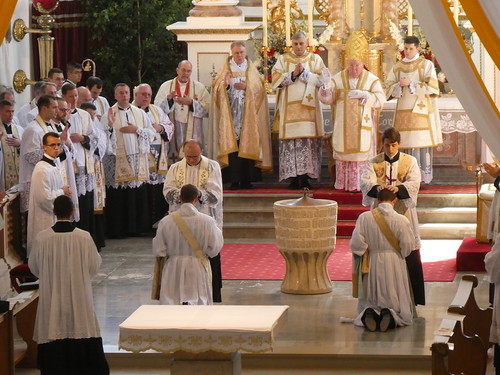 |
| The laying-on of hands at the recent priestly ordination in Bavaria for the Fraternity of St Peter. |
Desiderio desideravi: “with desire have I desired,” Our Lord said to His Disciples before the Last Supper, “to eat this Pasch with you.” The quaint Latin phrase is a literal translation of the Greek of the Gospels (Luke 22:15; Matthew 13:14), but it is no less quaint in Greek. It is in fact an expression at home in Hebrew, which does this kind of thing to express a superlative. No doubt this was an expression in use in Our Lord’s native Aramaic as well. The fidelity of a succession of translators has brought it to us today as something at once mysterious, poetic, intriguing, and rather beautiful. The effort necessary to understand it, its very elusiveness, has the effect of fixing it in our minds, and making it echo in our souls. To put it another way, the slight barrier to propositional understanding increases its transformative potential for us.
Every poet, every novelist, knows this. It is a mystery hidden, however, from modern Biblical translators, who come up with phrases like the one used in the English version of Pope Francis’ Apostolic Letter of this name: ‘I have earnestly desired.’ It is flat, utilitarian, and drab; defensible as a translation, to be sure, on modern principles, but about as memorable as a corporate mission statement.
Which is to be master, one may ask? The Church’s Tradition, which draws us in through mystery, or the flattened-out, dreary rationalism of liturgical Modernism? It is a problem with which Pope Francis struggles in this Letter. He sees the struggle in terms of avoiding two bad options, which present themselves as opposites.
I want the beauty of the Christian celebration and its necessary consequences for the life of the Church not to be spoiled by a superficial and foreshortened understanding of its value or, worse yet, by its being exploited in service of some ideological vision, no matter what the hue (16).
No comments:
Post a Comment